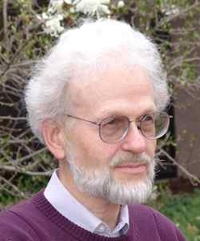Apr 16 2015
David Nygren, Presidential Distinguished Professor of Physics at The University of Texas at Arlington and a member of the National Academy of Sciences, has been named a recipient of the Aldo Menzione Prize for 2015 by the executive board of the Frontier Detectors for Frontier Physics Association.
 Nygren
Nygren
Nygren is being honored for his invention of the Time Projection Chamber, which has been used worldwide for more than three decades in a variety of applications in particle detection and discovery, ranging from relativistic heavy ion collisions to the search for Dark Matter and extremely rare nuclear decays.
The Aldo Menzione Prize is awarded to distinguished scientists who have contributed to the development of detector techniques with outstanding achievements.
“I was completely surprised and more than a bit overwhelmed,” Nygren said of his reaction when he learned he was named a recipient. “When one is selected by your peers for recognition, it is particularly meaningful.”
The award is given every three years to coincide with the Pisa Meeting on Advanced Detectors. Nygren will accept the award May 25 during the 13th Pisa Meeting on Advanced Detectors at Elba Island, Italy. Italian physicist Fabio Sauli was named a 2015 co-recipient of the award. The prize consists of a cash award and a silver plate citing the recipient’s contributions.
UT Arlington President Vistasp Karbhari commended Nygren and said the international recognition heightens awareness of faculty excellence at UT Arlington and in the College of Science.
“Dr. Nygren’s selection as the co-recipient of the Aldo Menzione Prize is a well-deserved achievement,” Karbhari said. “The honor represents the highest level of recognition for his work by the leading researchers in the world of physics. We are proud of the tremendous work that he and colleagues in the Department of Physics are doing to elevate scholarship and research at UT Arlington.”
Nygren, a renowned expert in particle physics, developed the Time Projection Chamber in 1974 to enable accurate and complete capture of the outcome of a collision of a very high energy particle with other particles in a colliding beam experiment. These collisions can lead to the production of hundreds or even thousands of new particles created in the collision.
“In a real sense, the TPC idea allowed three-dimensional images to be reconstructed for such complex events for the first time,” Nygren said. “Since its origin, the TPC idea has evolved to include many other applications in physics such as the search for very rare events. One example would be a collision of a heavy Dark Matter particle with ordinary matter. Forty years after invention, it is rare indeed for a technique to display such adaptive powers.”
Nygren joined the UT Arlington Department of Physics in August 2014. He previously worked at the Lawrence Berkeley National Laboratory for more than 30 years. While there, he was promoted to Distinguished Scientist in 1995 because of his invention of the TPC and innovations in charge-coupled devices used in digital imaging as well as medical imaging and pixel arrays. Nygren earned his Ph.D. at the University of Washington in 1967 and is a fellow of the American Physical Society.
Among the many distinguished awards he has received, are the Berkeley Lab Prize - Lifetime Achievement Award in 2013; the Panofsky Prize in Experimental Particle Physics from the American Physical Society in 1998; and the Ernest Orlando Lawrence Award from the Department of Energy in 1985. He was named a member of the National Academy of Sciences in 2000.
Aldo Menzione was a renowned physicist and a pioneer in the development and use of silicon vertex detectors. He was a co-recipient of the Panofsky Prize in 2009. He died in 2012 at age 69.